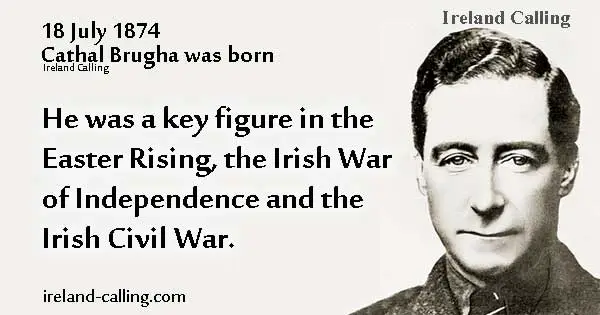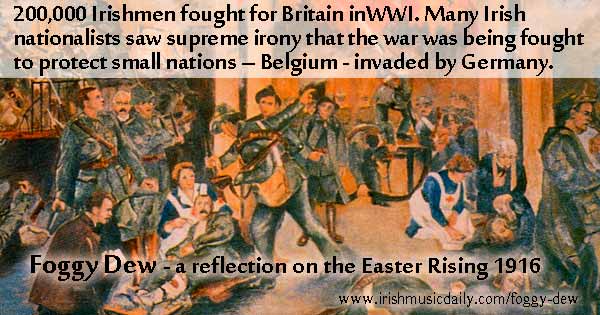Cathal Brugha was an Irish nationalist and a key figure in the Easter Rising, the Irish War of Independence and the Irish Civil War.
He also held positions in the Irish parliament, and was the first Chairman of Dáil Éireann.
He took the anti-treaty side in the Irish Civil War and bled to death on 7 July in 1922 after being shot in the leg by the Irish Free State Army.
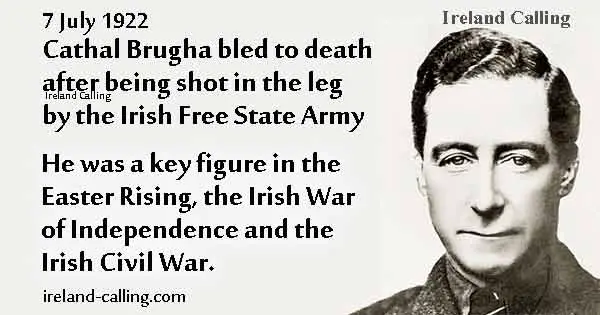
Cathal Brugha was born Charles William St. John Burgess in Dublin on 18 July, 1874. He adopted the Irish version of his name as his nationalist views took hold after he joined the Gaelic League in 1899.
His nationalist views became stronger over the next 10 years and he became involved in the Irish Republican Brotherhood. In 1914, he was the commanding officer of a troop of 20 men in the mission to collect arms that had been smuggled into Ireland at Howth near Dublin.
Easter Rising – Brugha shot
Brugha fought in the Easter Rising in 1916 under the command of Éamonn Ceannt at the South Dublin Union. When the rebels were forced to surrender, Brugha had already been shot.
He was too weak to stand and ordered his troops to flee as the British fired shells and machine guns at the building. Ceannt went back for Brugha and reportedly found him lying at a window shooting his pistol at the British while singing ‘God Save Ireland’.
Ceannt managed to get Brugha out safely as the rebels surrendered. It was thought that he would die from his injuries but he made a recovery over the next year, although he was left with a limp.
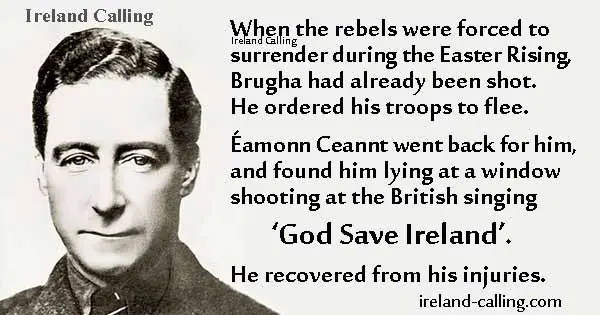
A year later Brugha initiated the merger of the Irish Volunteers and the Irish Citizen Army to create the Irish Republican Army.
He became the IRA’s Chief of Staff and was then elected as the MP for Co Waterford in the British General Election of 1918, after standing as a Sinn Féin representative.
Sinn Féin refused to accept they were part of the British parliament and instead began setting up their own assembly. In 1919, party leader Éamon de Valera and Arthur Griffiths were out of the country so Brugha chaired the first ever Dáil Éireann meeting.
He had the honour of reading out the Declaration of Independence in Irish, confirming the independence of the Irish Republic, even though the country remained under British rule at the time.
Brugha’s participation in the Irish War of Independence was as a politician rather than a soldier. He wasn’t a supporter of Michael Collins and his tactics. Brugha believed Collins and the IRA were undermining Dáil Éireann.
By using guerrilla-type attacks on the British, the IRB were blocking the Dáil from bringing a peaceful end to the conflict.
Brugha argued with Collins that ambushes on the British forces should not become violent until the victims had first been given the opportunity to surrender.
He also proposed that the rebels take the war on to British soil in order to catch their opponents off guard. Both ideas were dismissed by Collins.
When the Anglo-Irish Treaty was in the early stages of negotiation in 1921, Brugha strongly opposed it.
Some historians have argued that Brugha made a mistake by turning the debate of whether or not the Irish should sign the Treaty into a vote on Collins’ popularity. The vote went in favour of Collins and the Treaty was signed.
Outbreak of the Irish Civil War
The signing of the treaty prompted the outbreak of the Irish Civil War, with the IRA split into pro-treaty and anti-treaty factions. The pro-treaty were now known as the Irish Free Staters and under the terms of the Treaty, they were running the country.
Brugha sided with the anti-treaty side but tried to persuade them not to take up arms against the Free State.
The leaders refused and Rory O’Connor led a group of men in seizing the Four Courts building in Dublin in the hope that it would provoke a military response from Britain which would turn the Irish Free State back on the side of the anti-treaty IRA.
Brugha tried to persuade O’Connor to surrender but he refused. Michael Collins, leader of the Free State troops, tried to negotiate with O’Connor for a peaceful resolution.
O’Connor kidnapped a soldier of the Free State Army forcing Collins to give the order to open fire on the Four Courts.
Brugha was reluctantly dragged into the fighting on the anti-treaty side. He was ordered to seize the area around O’Connell Street to take the pressure off the Four Courts.
He did so, but the Free State began to attack them too. When the building Brugha and his troops were in caught fire, he ordered them to surrender to the Free State Army, knowing that any other action would result in their deaths.
However, Brugha did not surrender himself and emerged from the building wielding a firearm at the Free State Army. They opened fire on him and hit him in the leg, knocking him to the ground.
The bullet had severed a major artery in Brugha’s leg and he bled to death. He was buried in Glasnevin Cemetery. Both Brugha’s wife and son went on to become members of the Dáil.
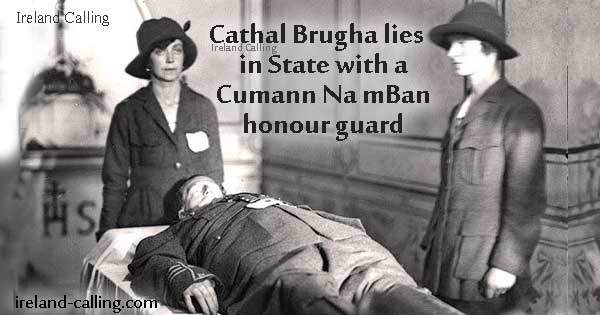 Click here to read about more key characters from Irish history
Click here to read about more key characters from Irish history
Click here to read more about the Easter Rising
The song, The Foggy Dew, sums up Irish feelings about Easter Rising tells the story of the Easter Rising at the same time as describing the sentiments many Irish people felt as they reflected on what happened.
They felt things could have been so different if only some of those 200,000 Irish servicemen had fought with the rebels instead of fighting for Britain in foreign war zones.
Read the background and history of The Foggy Dew with links to lyrics.chords and videos.
More popular articles and videos
The real life mystery of what Maureen O’Hara whispered to make John Wayne look so shocked
Matt Damon winning hearts and minds with charm assault on Ireland
Action hero Tom Cruise was once attacked by an old man in a Kerry pub
Liam Neeson speaks about his late wife in emotional interview
Dating site explains why Irish men make wonderful husband material
Billy Connolly says public should ignore politicians and listen to comedians
Take a look inside Hollywood star Saoirse Ronan’s stunning Irish home
